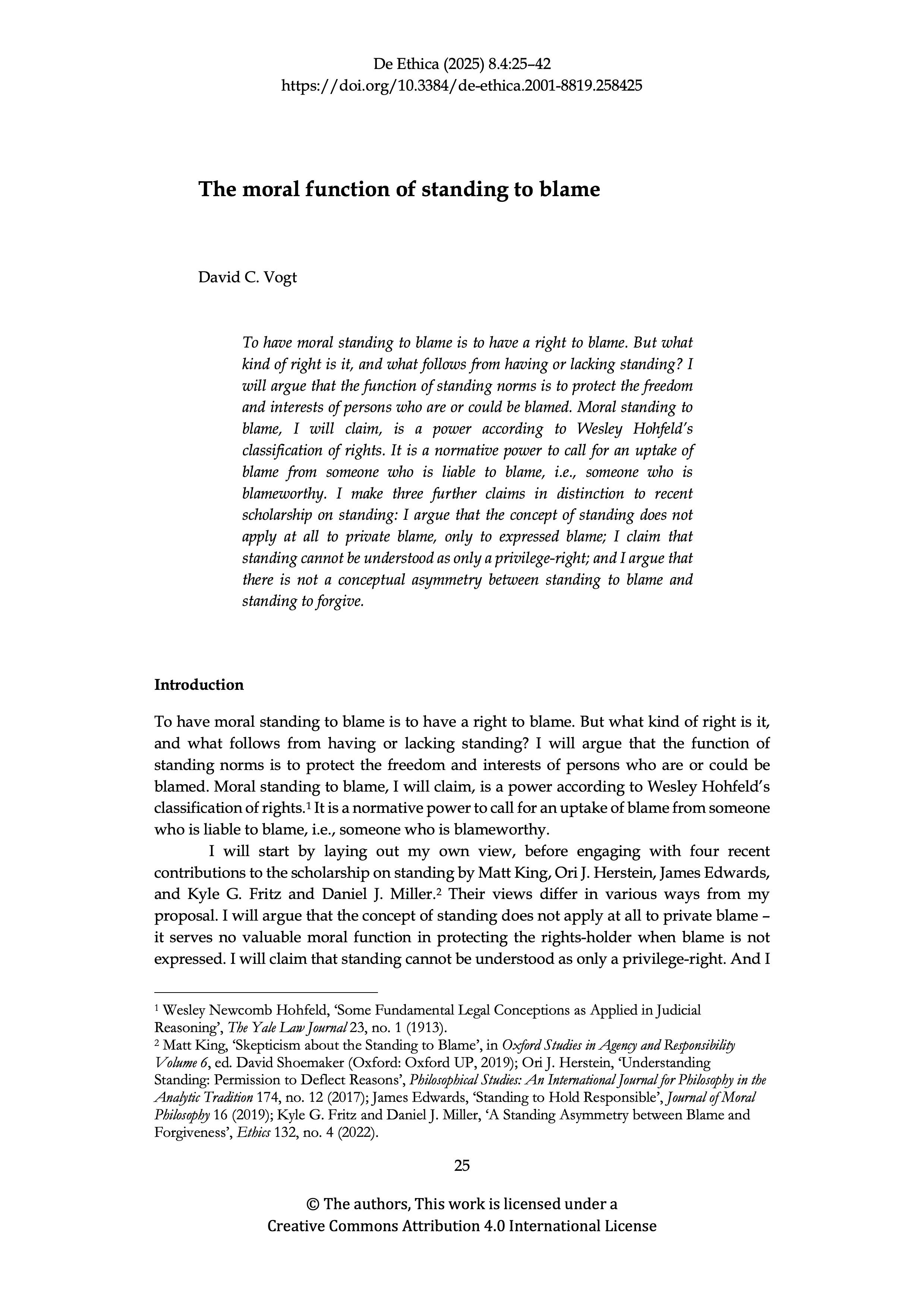The moral function of standing to blame
DOI:
https://doi.org/10.3384/de-ethica.2001-8819.258425Abstract
To have moral standing to blame is to have a right to blame. But what kind of right is it, and what follows from having or lacking standing? I will argue that moral standing to blame should be understood as a power according to Wesley Hohfeld’s classification of rights (1913). It is a normative power to call for an uptake of blame from someone who is liable to blame, i.e., someone who is blameworthy. The function of standing norms, I will argue, is to protect the freedom and interests of persons who are or could be blamed.
I make three further claims in distinction to recent scholarship on standing: I argue that the concept of standing does not apply at all to private blame, only to expressed blame; I claim that standing cannot be understood as only a privilege-right; and I argue that there is not a conceptual asymmetry between standing to blame and standing to forgive.
References
Austin, J. L. How To Do Things With Words. Barakaldo Books, 2020.
Bell, Macalester. ‘The Standing to Blame: A Critique.’ In Blame: Its Nature and Norms, edited by D. Justin Coates and Neal A. Tognazzini, 0: Oxford UP, 2012.
Berman, Mitchell N. ‘Blameworthiness, desert, and luck.’ Noûs (2021), 57, pp. 370–390.
Cohen, G. A. ‘Casting the First Stone: Who Can, and Who Can't, Condemn the Terrorists?’. Royal Institute of Philosophy Supplement 58 (2006), pp. 113-36.
Dover, Daniela. ‘The Walk and the Talk.’ The Philosophical Review 128:4 (2019), pp. 387-422.
Duff, R. A. ‘Blame, Moral Standing and the Legitimacy of the Criminal Trial.’ Ratio 23:2 (2010), pp. 123-40.
Edwards, James. ‘Standing to Hold Responsible.’ Journal of Moral Philosophy 16 (2019), pp. 437-62.
Enoch, David, and Levi Spectre. ‘There is no such thing as doxastic wrongdoing.’ Philosophical Perspectives (2022).
Fletcher, William A. ‘The Structure of Standing.’ The Yale Law Journal 98:2 (1988), pp. 221-291.
Fritz, Kyle G., and Daniel J. Miller. ‘Hypocrisy and the Standing to Blame.’ Pacific Philosophical Quarterly 99:1 (2018), pp. 118-39.
Fritz, Kyle G., and Daniel J. Miller. ‘A Standing Asymmetry between Blame and Forgiveness.’ Ethics 132:4 (2022).
Hart, H. L. A. ‘Are There Any Natural Rights?’. The Philosophical Review 64:2 (1955), pp. 175-91.
Herstein, Ori J. ‘Justifying Standing to Give Reasons: Hypocrisy, Minding Your Own Business, and Knowing One’s Place.’ Philsopher’s Imprint 20:7 (2020), pp. 1-37.
Herstein, Ori J. ‘Understanding Standing: Permission to Deflect Reasons.’ Philosophical Studies: An International Journal for Philosophy in the Analytic Tradition 174:12 (2017), pp. 3109-32.
Hohfeld, Wesley Newcomb. ‘Some Fundamental Legal Conceptions as Applied in Judicial Reasoning.’ The Yale Law Journal 23:1 (1913), pp. 16-59.
Isserow, Jessica, and Colin Klein. ‘Hypocrisy and Moral Authority.’ Journal of Ethics and Social Philosophy 12:2 (2017).
Kant, Immanuel. The Metaphysics of Morals. The Cambridge Edition of the Works of Immanuel Kant: Practical Philosophy. Cambridge: Cambridge UP, 1996.
Katz, Leora Dahan. ‘Response Retributivism: Defending the duty to punish.’ Law and Philosophy 40 (2021), pp. 585-615.
King, Matt. ‘Skepticism about the Standing to Blame.’ In Oxford Studies in Agency and Responsibility Volume 6, edited by David Shoemaker, 1-33 downloadable pdfversion. Oxford: Oxford UP, 2019.
Kontorovich, Eugene. ‘What Standing Is Good For.’ Virginia Law Review 93:7 (2007), pp. 1663-728.
Lippert-Rasmussen, Kasper. ‘A Duty not to Remain Silent: Hypocrisy and the Lack of Standing not to Blame.’ The Philosophical Quarterly 73:4 (2023), pp. 933-49.
Lippert-Rasmussen, Kasper. ‘Praising Without Standing.’ The Journal of Ethics 26:2 (2022), pp. 229-46.
Lippert-Rasmussen, Kasper. ‘Why the moral equality account of the hypocrite’s lack of standing to blame fails.’ Analysis 80:4 (2021), pp. 666-74.
Macnamara, Coleen. ‘Taking Demands Out of Blame.’ In Blame: Its Nature and Norms, edited by D. Justin Coates and Neal A. Tognazzini. Oxford: Oxford UP, 2013.
McKenna, Michael. ‘Directed Blame and Conversation.’ In Blame: Its Nature and Norms, edited by D. Justin Coates and Neal A. Tognazzini. Oxford: Oxford UP, 2013.
Piovarchy, Adam. ‘Hypocrisy, Standing to Blame and Second-Personal Authority.’ Pacific Philosophical Quarterly 101 (2020), pp. 603-27.
Raz, Joseph. The Morality of Freedom. Oxford: Oxford University Press, 1986.
Raz, Joseph. ‘On Respect, Authority, and Neutrality: A Response.’ Ethics 120 (2010), pp. 279-301.
Roadevin, Cristina. ‘Hypocritical Blame, Fairness, and Standing.’ Metaphilosophy 49:1-2 (2018), pp. 137-52.
Statman, Daniel. ‘Why disregarding hypocritical blame is appropriate.’ Ratio (2022).
Telech, Daniel, and Hannah Tierney. ‘The Comparative Nonarbitrariness Norm of Blame.’ Journal of Ethics and Social Philosophy 16:1 (2019).
Todd, Patrick. ‘A Unified Account of the Moral Standing to Blame.’ Noûs 53:2 (2019), pp. 347-74.
Vogt, David C. ‘The Natural Meaning of Crime and Punishment: Denying and Affirming Freedom.’ Criminal Law and Philosophy 17 (2023), pp. 339–58.
Vogt, David Chelsom. ‘Why the Moral Equality Account of Hypocrisy Does Not Fail After All.’ The Journal of Ethics 28 (2024), pp. 171–86.
Wallace, R. Jay. ‘Hypocrisy, Moral Address, and the Equal Standing of Persons.’ Philosophy & Public Affairs 38:4 (2010).
Wenar, Leif. ‘Rights.’ The Stanford Encyclopedia of Philosophy (Spring 2023 Edition) (2023).

Downloads
Published
Versions
- 2025-04-09 (2)
- 2025-04-09 (1)
How to Cite
Issue
Section
License
Copyright (c) 2025 David Chelsom Vogt

This work is licensed under a Creative Commons Attribution 4.0 International License.
